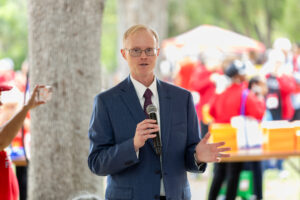On Thursday, November 10, the Texas Retired Teachers Association (TRTA) attended and spoke during the Texas Public Policy Foundation (TPPF) event Rethinking Retirement: Solutions to Secure Texas’ Public Pension Plans.
Representing TRTA on two separate panels were Executive Director Tim Lee and Retirement Consultant and former Executive Director of the Teacher Retirement System of Texas (TRS) Ronnie Jung.
Tim Lee spoke on the second panel of the day “Are Pension Problems Brewing in the Lone Star State?” The panel members took an in-depth look into the policy landscape in Texas to determine what problems exist, if any, and the ideal solution(s) to put forward in the next legislative session.
Joining Tim on the panel were Texas State Representative Jim Murphy (District 133, R-Houston), John Diamond of Rice University (Kelly Fellow in Public Finance, Baker Institute), Max Patterson of the Texas Associations of Public Employees Retirement Systems (TEXPERS), and Chris Brown, Controller for the city of Houston. The panel was moderated by The Honorable Bill Hammond, former Texas State Representative and current CEO of the Texas Association of Business.

Left to right: Rep. Jim Murphy, Max Patterson and Tim Lee discuss
the merits of the TRS defined benefit plan.
While the panel discussion focused mostly on growing pension funding concerns for Dallas municipal funds and the recent changes proposed for Houston municipal funds, the topic of TRS was mentioned.
While panelist Chris Brown felt that pension funds, ideally, should be funded at 100 percent, Tim Lee expressed that an 80 percent funding ratio is considered by most professionals in the industry to be the hallmark of a healthy fund. Max Patterson concurred with this remark, adding that to determine the fiscal health of a fund, one cannot look only at the funded ratio.
Tim Lee said in 2008 after the stock market crash caused TRS to lose $40 billion, the agency did not have a “kneejerk reaction approach,” and instead made decisions based on a long-term horizon, eventually bringing the fund back up by $50 billion over the next five years.
Today, the fund has approximately $130 billion in assets set aside for over one million public education retirees and pre-retirees. The average monthly annuity for a current TRS retiree is $2000, while 30 percent of retirees (105,000+) earn less than $1000 per month.
TPPF is well-known for funding research about pension funds in Texas, including TRS. TPPF released this report in September 2016, stating that TRS should be changed from a defined benefit plan to a defined contribution plan. Among TPPF’s recommendations to legislators are that they should “freeze enrollment in the current defined benefit (DB) system and enroll newly hired or unvested employees in a 401(k)-style defined contribution pension plan” and “implement either a hard or soft freeze of the system for vested employees.”

Tim Lee listens to a question from an audience member about the differences
between state-run defined benefit plans and locally controlled plans.
As our members know, TRTA supports maintaining the DB pension plan for all TRS retirees, current and future. TRS is the sole form of financial retirement security for the majority of TRS participants, because 95 percent of school employees in Texas do not pay into the federal Social Security program. Furthermore, those that do pay in or have spouses who work in the private sector often lose a large percentage, if not all, of the SS income they earned due to the Windfall Elimination Provision (WEP) and the Government Pension Offset (GPO).
In 2013, TRTA worked closely with legislators and stakeholder groups to pass legislation to put TRS on a path to solvency. Senate Bill 1458 developed a long-term plan for resolving TRS’s unfunded liabilities while maintaining retirement security for more than one million retired and active Texas educators. TRTA will continue to advocate for maintaining this plan in 2017, so that your retirement security is protected.
TRTA also supports the good work being done by the TRS staff and Board of Trustees. Over the nearly 80-year existence of the fund, 64 percent of its revenue has been generated through investments. While the state and active educators contribute to the fund, TRS wisely utilizes those contributions to grow the fund and make retirement benefits available for our hardworking public school employees.
Later in the day, Ronnie Jung participated in the panel “Keeping the Promise: Is it Time to Modernize Texas’ Pension Systems?” He spoke on behalf of the non-profit group Texans for Secure Retirement. This panel discussed an exploration of the efforts to modernize Texas’ state and local retirement systems through transitioning from defined benefit (DB) system to a defined contribution (DC) model.

Left to right: Bill King, Joe Arnall, Sen. Paul Bettencourt, Keith Brainard and Ronnie Jung
discuss whether DB plans should be replaced.
Ronnie was joined by Texas State Senator Paul Bettencourt (District 7, R-Houston), Bill King, former Houston mayoral candidate, the Honorable Joe Arnall, former member of the Florida House of Representatives, and Keith Brainard of the National Association of State Retirement Administrators (NASRA). The panel was moderated by James Quintero of TPPF.
The panel featured an intense debate between Bettencourt, King and Brainard about the quality of DC plans compared to DB plans, with King and Bettencourt advocating for DC plans.
During one particularly heated exchange, Brainard described the panel as a “freak show” only focused on the worst pensions and not talking about the great DB plans functioning all across the state and country.
Meanwhile, King stated that it was unfair not to offer teachers the option to opt out of DB plans, and that college professors are opting out of DB plans at a 70 percent rate. King additionally stated that pension crises are occurring as more people are living longer.
Jung refuted this argument as he stated that investment professionals are able to accurately predict mortality rates. Jung also argued that the TRS pension plan is an excellent value to taxpayers, as they are exempt from subsidizing Social Security for teachers.
The audience for the panels was replete with DC supporters, and throughout the debates people chimed in with applause for the DC proponents.
If any retired or active TRS member thought the attack on the TRS defined benefit plan may be going away, the TPPF event proved these attacks are actually growing stronger, louder and bolder than ever. The disdain for public service employees was voiced by at least one attendee in the audience who suggested firefighters were people paid to merely “spray water on fires.” While everyone connected to this event rejected this notion soundly, the comment reinforced the idea that public workers are over-paid and under-criticized.
TRTA and our public employee defender colleagues sincerely appreciate the work done by every schoolteacher, firefighter, police officer, state employee and member of the military. We will defend your earned benefits and urge our elected officials to enact public policy that protects your retirement.
Thank You
Protecting your retirement benefits is TRTA’s top priority, and your participation can make all of the difference. Be sure to stay tuned to our other digital mediums to keep informed on all the latest news and updates. Like us on Facebook, follow us on Twitter, and subscribe to our YouTube channel.
If you are not already a member of TRTA, please join today. Only by working together will we be able to resolve the WEP. If you are already a member, please encourage your fellow retirees to join and renew.



